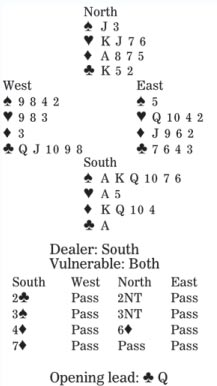When on defense, be active or passive

 |
| [Photo provided to China Daily] |
Roald Dahl wrote, "The only sensible thing to do when you are attacked is, as Napoleon once said, to counterattack."
That applies in many situations, but not always at the bridge table. When declarer is attacking, sometimes the best defense is to sit back quietly and wait for tricks to appear. In other deals, though, the defenders must actively counterattack.
In today's layout, South is in seven diamonds. What happens after West leads the club queen?
How should North-South have reached seven no-trump, where they have 13 top tricks: six spades, two hearts, three diamonds and two clubs? Once North responded two no-trump, South could have jumped to four clubs, Gerber. When North showed one ace and two kings, seven no-trump had to have play, if not be laydown.
In seven diamonds, declarer must draw trumps without loss. The normal approach is to cash the king, then cross to the ace. If the suit is 3-2, South can claim. Or if West discards on the second round, declarer finesses his 10. So, here, the contract seems destined to succeed. However, East has a counterattack-if he can make the play in tempo. Under South's king, East must drop the nine. Then declarer will wonder if West began with J-6-3-2. If so, South needs to cash his queen next-with fatal consequences here.
Declarer, though, has his own counterattack. He should start diamonds by leading low from the dummy. Then it is dangerous for East to play the nine because West might have a singleton 10.




































